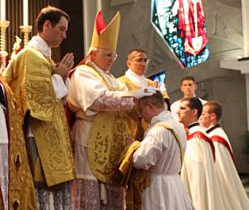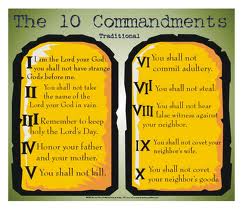Politics and Religion Pt. 2 – The Question of Voting

There are many matters involving both faith and morals where there is room for legitimate differences of opinion among Catholics. As an apologist, I often get this question, especially during election cycles: “What about the death penalty? What about War? Shouldn’t Catholics be against War? What about the right to health and education?” In fact, whenever these issues come up in dialogue it always reminds me of an encounter I had some years ago.
I was giving a parish mission and it was going quite well. One afternoon, I was at lunch with the pastor of the parish and we began to talk about the then up-coming elections. When I voiced my strong concern that Catholics only vote for pro-life and pro-family candidates, Father responded: “Tim, I don’t think this is as black and white as you say it is.” When he said this, I must say I was shocked! He brought up the very issues I mentioned above. “What about the death penalty, war, healthcare, education, etc.” I attempted to explain that there are certain issues that are non-negotiable that Catholics are not at liberty to debate. Abortion, euthanasia, embryonic stem cell research, cloning, and so-called homosexual “marriage” are intrinsic evils that must be opposed by all Catholics at the polls (religious liberty was not in play politically back then as it is now).
When Father attempted to use the war in Iraq, the death penalty and other lesser issues to justify voting for pro-abortion and pro-homosexual “marriage” candidates, I attempted to reason with him. I explained:
1. For Catholics, our “just war doctrine” is found in paragraph 2309 of the Catechism of the Catholic Church. And notice, the Church does not say “just war theory.” It says, “just war doctrine.” The wars in Iraq and Afghanistan can be debated among Catholics as to whether or not they were just in our given situation. But the fact that war can be justified in certain situations is Catholic doctrine. The Catholic Church is NOT pacifist! In other words, war is not intrinsically unjust. As Ecclesiastes 3:8 says: “There is a time for war and a time for peace.” Therefore, it is not one of the “non-negotiables” or “intrinsically unjust law[s]” that Catholics are bound to oppose.
2. Similarly, the death penalty has always been upheld as a legitimate and potentially just punishment in Catholic Tradition as well as in Scripture. Genesis 9:6 says, “He who sheds the blood of man, by man shall his blood be shed; for God created man in his own image.” In CCC 2267, the Magisterium of the Church tells us the Church has always held to the legitimacy of recourse to the death penalty, and that has not changed, though, according to the Catechism, examples today of the necessity of using it are, “rare, if not practically non-existent.” Now, this latter statement in the Catechism that actually quotes Pope John Paul II’s Encyclical Letter, “Evangelium Vitae,” paragraph 56, is not making a dogmatic statement; rather, it is a matter of prudential judgment. Catholics are free to debate the issue of when the death penalty should or should not be employed. In fact, then Cardinal Ratzinger, now Pope Emeritus Benedict XVI, when he was Prefect of the Sacred Congregation for the Doctrine of the Faith, said, in a document called, “Worthiness to Receive Holy Communion: General Principles, 3:”
Not all moral issues have the same weight as abortion and euthanasia. For example, if a Catholic were to be at odds with the Holy Father (John Paul II) on the application of capital punishment or on the decision to wage war, he would not for that reason be considered unworthy to present himself to receive Holy Communion. While the Church exhorts civil authorities to seek peace, not war, and to exercise discretion and mercy in imposing punishment on criminals, it may still be permissible to take up arms to repel an aggressor or to have recourse to capital punishment. There may be a diversity of opinion even among Catholics about waging war and applying the death penalty, but not however with regard to abortion and euthanasia.
So again, the key here, I said to Father, is to understand that capital punishment and the death penalty are not “non-negotiable” matters. They must not be considered as one of the “non-negotiables” for Catholics.
3. When it comes to education and healthcare, the Church does speak of these as being “rights,” among others, for example, in the Pastoral Constitution on the Church in the Modern World—Gaudium et Spes 26—as well as in Pope John Paul II’s 1988 Apostolic Exhortation Christifideles Laici, 38.
I know this upsets some conservatives when I use this language. But they are rights nonetheless. However, because they are “rights” does not mean they must be free, folks! Nor does it mean they have to be or even should be provided by the government. This is a matter of debate, at the very least. In fact, the principle of subsidiarity and the Church’s condemnation of socialism must be taken into account here, but that is matter for another blog post.
But in order to bring clarity to this matter, think about this: I have a right to food and drink, but that does not mean under ordinary circumstances I can just plunder grocery stores at will and expect everyone else to pay for it! In other words, just how these “rights” to education and healthcare are to be protected and realized in the lives of people is a matter of debate. I always say to Catholic folks who believe healthcare should be provided for free by the government because health care is a “right,” are they willing to make Catholic education free across the board as well? After all, education is listed as a “right” by the same documents that list “healthcare” as a right. Would our bishops be ready to pay for every Catholic who wills it to go to Notre Dame, or any other Catholic university? I think not!
The bottom line here is this: All of the rights the Church lists as such is not the question. The real debate is over the best way these rights can be protected and promulgated. And this is a matter of legitimate debate. And thus, these too — the right to healthcare and education — are not “non-negotiables.”
Unfortunately, I must say that my arguments didn’t seem to be getting anywhere until I had had about enough. My response became perhaps a bit too impassioned, but I remember saying to the good Padre, “You have the liberty of saying these issues are not black and white because they are not coming to cut your head off. But I guarantee you, Father, if the candidate you are voting for were to say—’On the day I am elected, my first order of business is that I am going over to Father Smith’s house and I am going to cut his head off’—I bet you would vote for the other guy! The fact is, they are coming to cut off the heads of millions more little pre-born babies in the sanctuary of their mother’s wombs, if we do not stand up for those who cannot stand up for themselves, and vote accordingly!”
Father’s response was: “You make a good point, Tim.”
But this is not about “making a good point,” is it? This, my friends, is literally a matter of life and death.
THE BOTTOM LINE
And I suppose this is the real heart of the matter. It seems to me that one of the most important messages we can send to Catholics today, is that when we speak of these five “Non-Negotiables,” (six now with the advent of the Obama Administrations assault on religious liberty) we are speaking about human lives and human souls being on the line. It seems too many Catholics have too often grown cold and indifferent with regard to what it is we are talking about when we talk about voting and when we talk about the “non-negotiables” that should inform the decision-making process of all Catholics. When we are talking about the non-negotiables, the old saying applies, “But other than that, Mrs. Lincoln, how was the play?”
To the Heart of the Matter
The Catechism of the Catholic Church tells us that it is “morally obligatory” for we who live in free societies with various representative forms of governments to vote in CCC 2240. And when it comes to laws in favor of homosexual so-called “marriage,” euthanasia, abortion, cloning or fetal stem cell research, and the assault on religious liberty, Pope St. John Paul II, in Evangelium Vitae, 73.1-73.2, has declared that each and every one of us has a “grave and clear obligation to oppose [these laws] by conscientious objection.” In fact, St. John Paul the Great also said, “In the case of an intrinsically unjust law…it is never licit to obey it, or to ‘take part in a propaganda campaign in favor of such a law or vote for it.’” And notice here that even though the Pope was referencing abortion in particular, he does not limit himself to abortion. He teaches us the same applies to any intrinsically unjust law. We as Catholics need to understand that we are speaking of a “grave obligation” here! And we need to understand the seriousness of this matter more so than most because we are the ones who believe that what we do in grave matters will effect where we spend eternity!
According to our Holy Father Pope St. John Paul II, we have a “grave obligation” not to vote for any of these “non-negotiables.” Now, some may say at this point: “I’m not voting for abortion, I am only voting for a candidate who votes for it!” Sorry, folks, you’re not off the hook so easy. Because we live in a representative form of democracy, we are voting for abortion indirectly if we vote for politicians who are pro-abortion. This is out of the question for Catholics!
Is There a Loophole Here?
But what about this statement from then Cardinal Ratzinger’s 2004 letter that we quoted before, “Worthiness to Receive Holy Communion: General Principles,” paragraph 6:
A Catholic would be guilty of formal cooperation in evil, and so unworthy to present himself for Holy Communion, if he were to deliberately vote for a candidate precisely because of the candidate’s permissive stand on abortion and/or euthanasia. When a Catholic does not share a candidate’s stand in favor of abortion and/or euthanasia, but votes for that candidate for other reasons, it is considered remote material cooperation, which can be permitted in the presence of proportionate reasons.
The key here is “proportionate reasons.” There are two issues we need to address here: First, in the case of voting for a pro-abortion candidate, one can only do so if, as Pope St. John Paul II said in Evangelium Vitae 73, you have a case analogous to this:
An elected official whose absolute personal opposition to procured abortion was well known could licitly support proposals aimed at limiting the harm done by such a law and at lessening its negative consequences at the level of general opinion and public morality.
In the same way, if a Catholic voter finds himself in a situation where both candidates are pro-abortion, a Catholic may vote for the candidate that will best limit the harm being done to the innocent, or if you have a case where both candidates are so pro-death that the Catholic cannot bring himself to vote for either candidate, he can choose not to vote at all. That is a legitimate option.
In the case of voting for the candidate who “limits the harm done” more so than the other, this is not a vote for abortion, even though the candidate one votes for may be pro-abortion; In this case one is voting for the good of limiting the amount of harm being done in the best way available. As an example, let’s say you are faced with both candidates in an election being pro-abortion, but one candidate is in favor of limiting late-term abortions and the other is not. Obviously, curtailing late-term abortions would necessarily save innocent human life. That’s a good thing and certainly worth voting for.
Now, in the case of voting for a pro-abortion candidate when there is a pro-life candidate available, that is where the “proportionate reasons” of which Cardinal Ratzinger wrote would come in. That means voting for a pro-abortion candidate even though there is a pro-life candidate available because of other positions held by the pro-life candidate that are proportionally more grave than abortion. And this is a possibility. However, we should note here that there simply is no case today, at least not in the United States, where one could reasonably do so because there is nothing else in play politically in this country that would be proportionate to the horror of abortion.
Is there an example where there would be “proportionate reasons” to vote for a pro-abortion candidate over a pro-life candidate? Yes! If, for example, we had an Osama Bin Laden-like character running for office against a pro-abortion candidate from one of our two parties here in the United States.
Now by an “Osama Bin Laden-like character,” I mean he would be against abortion while simultaneously being in favor of the genocide of whole peoples and religions (like all Jews and Christians!). One could safely say this would be a case where there would be proportionate reason to vote for a pro-abortion candidate, assuming of course that the other candidate is against this genocide. Why? Well, with abortion, as horrid as it is, we are talking about the murder of ca. 1.2-1.5 million innocent human beings per year in the United States alone. In this scenario we’d be talking about slaughtering 100’s of millions of people! But other than that scenario, or one similar, there is simply no proportionate reason I can envision where one could reasonably vote for a pro-abortion candidate over a pro-life candidate.
If you liked this post, you need to click here for more information.






